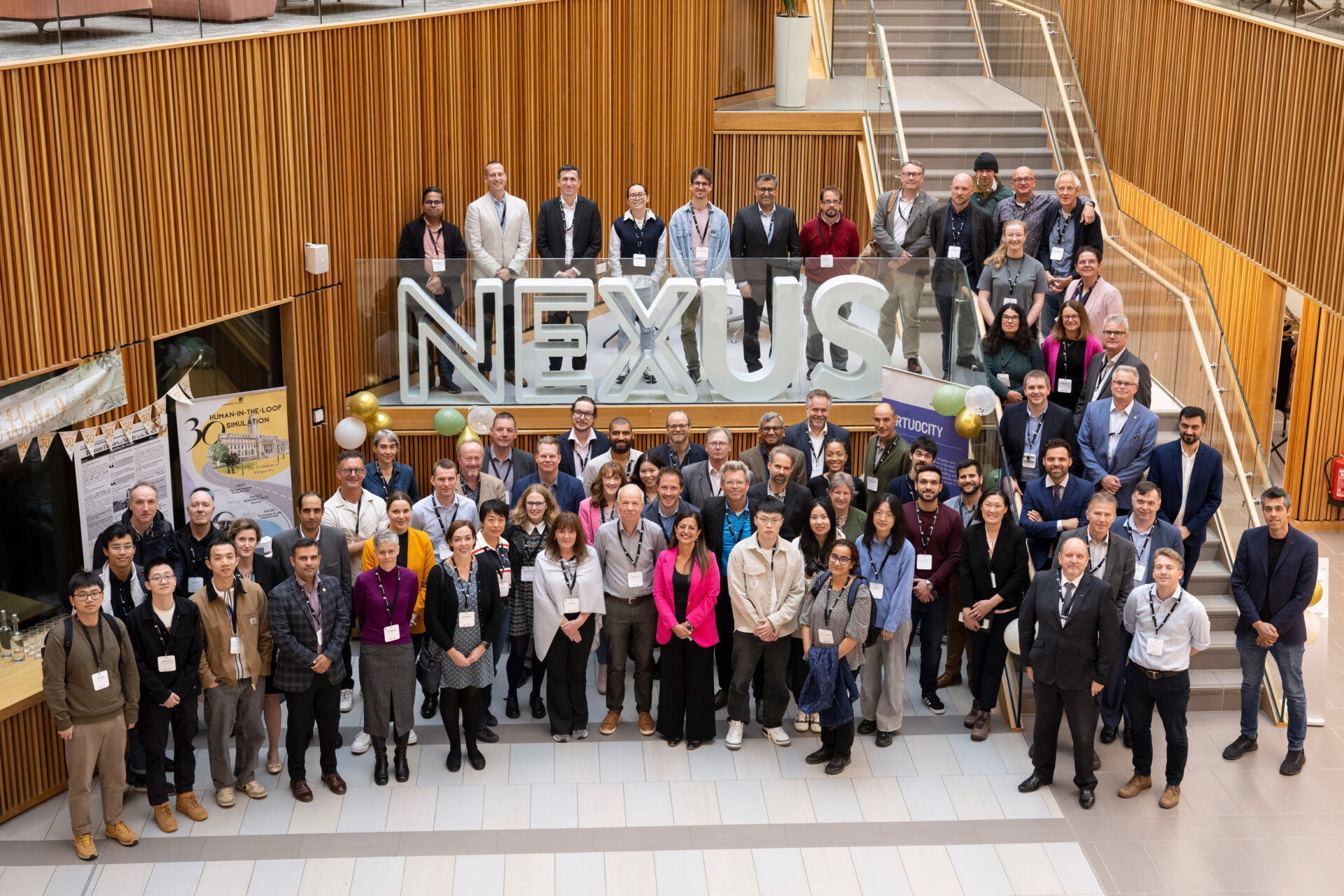Celebrating 30 Years of Driving Simulation at Leeds

2024 marks 30 years since the installation of the first Driving Simulator at the University of Leeds, facilitating three decades of groundbreaking research on human-in-the-loop simulator studies investigating road user behaviour, in a bid to improve road safety.
To mark the occasion, current and past members of the Human Factors and Safety group at the Institute for Transport Studies (ITS) were joined by an international team of colleagues and collaborators from Academia, Industry and Government Organisations, hosted at Nexus. Guests also had the chance to visit Virtuocity – The University’s Centre for City Simulation, which now hosts a range of additional human-in-the-loop simulators.
Guests were welcomed to the event by our Interim Vice Chancellor and President Professor Hai-Sui Yu and Professor Sarah Sharples, the Department for Transport’s Chief Scientific advisor, who reflected on the importance of Human Factors research in this field, as well as the continued impact of the group’s research over the past 30 years.

(Left to Right) Bob Bateman, Prof Simon Shepherd, Prof Natasha Merat, Prof Alan Haywood, Prof Hai-Sui Yu, Pete Woodthorpe, Prof Sarah Sharples outside Virtuocity
Professor Natasha Merat, who has been leading the group since 2008, and is academic lead of Virtuocity, then provided an overview of the team’s major achievements, highlighting key developments of the facilities, supported by over £30M of UK, European and industrial funding. Currently the UK’s largest team of researchers studying human factors of road transport, the ~50-strong multidisciplinary team of academics and PhD students, is world-renowned for its pioneering research and expertise in behavioural science, software engineering, computer vision and industrial design, and is responsible for developing the UK’s most advanced suite of human-in-the-loop simulators.
During a panel discussion led by Professor Nic Ward, who was a member of the team in the 1990s, current and past members of the group were joined by its founder Professor Oliver Carsten, who, together with current and past technical leads, provided a light-hearted journey through the successes and challenges of developing scenarios and equipment required for driving simulator research, over the years. Dr Hamish Jamson, Dr Albert Solernou, Mr Peter Woodthorpe and Professor Merat each shared personal anecdotes of their time working with the driving simulators at Leeds, focusing on the value of such facilities for investigating road user behaviour.

Panel 1 Chaired by Prof Nic Ward, University of Montana with panel members (From Left to Right) Pete Woodthorpe, Dr Albert Solernou, Prof Oliver Carsten, Dr Hamish Jamson and Prof Natasha Merat
The panel was followed by a keynote talk by former PhD student and Leeds Alumnus Professor Daniel McGehee. Currently Director of the Driving Safety Research Institute and National Advanced Driving Simulator at the University of Iowa, Professor McGehee provided a fantastic historical overview of how Driving Simulators have been used to tackle road safety issues since the mid-20th century, emphasising the importance of these facilities as we move towards more automated vehicles.
During a second panel discussion, chaired by Professor Linda Boyle, Vice Dean for Research at New York University, brought together members of academia and industry (Dr Ruth Madigan of University of Leeds, Prof. Birsen Donmez of University of Toronto, Dr Lee Skrypchuk of Jaguar Land Rover, Mr Bob Bateman of Nissan UK, and Prof. Trent Victor of Waymo) to discuss the relevance and accuracy of simulation research against real world tests and trials - highlighting the complementary value of each method, when studying road user behaviour.

Left to Right - Prof. Trent Victor, Prof. Dan McGehee, Bob Bateman, Prof. Birsen Donmez, Dr Ruth Madigan, Dr Lee Skrypchuk and Prof. Linda Boyle gather post Panel 2
The afternoon included four workshops, allowing us to focus on what might come next, mapping trends and opportunities for further research and collaboration. Facilitated by Leeds academics and partner organisations, attendees had the opportunity to discuss the value of simulators for addressing research on i) Human factors of road transport automation, ii) Road safety, iii) Road user behaviour modelling and machine learning, and iv) Human-in-the-loop simulation.
Finally, and most importantly, the day allowed us to celebrate our 30 years of successful and impactful research with cake and a toast to our future endeavours, as we await the arrival of our third generation driving simulator!

Members of the Human Factors & Safety Group past and present gather for cake
